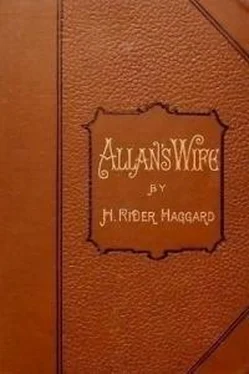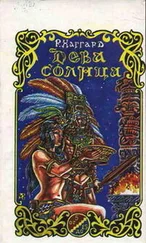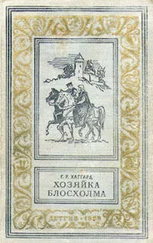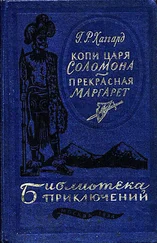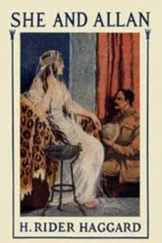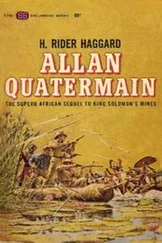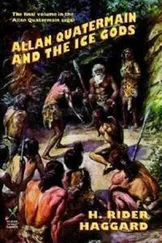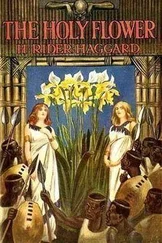Suddenly the thunder and lightning ceased for a minute, everything grew black, and, except for the rain, silent.
"It is over one way or the other, chief," I called out into the darkness.
"Wait, white man, wait!" answered the chief, in a voice thick with anxiety and fear.
Hardly were the words out of his mouth when the heavens were lit up again till they literally seemed to flame. There were the men, not ten paces apart. A great flash fell between them, I saw them stagger beneath the shock. Indaba–zimbi recovered himself first—at any rate when the next flash came he was standing bolt upright, pointing with his assegai towards his enemy. The chief's son was still on his legs, but he was staggering like a drunken man, and the assegai had fallen from his hand.
Darkness! then again a flash, more fearful, if possible, than any that had gone before. To me it seemed to come from the east, right over the head of Indaba–zimbi. At that instant I saw the chief's son wrapped, as it were, in the heart of it. Then the thunder pealed, the rain burst over us like a torrent, and I saw no more.
The worst of the storm was done, but for a while the darkness was so dense that we could not move, nor, indeed, was I inclined to leave the safety of the hillside where the lightning was never known to strike, and venture down to the iron–stone. Occasionally there still came flashes, but, search as we would, we could see no trace of either of the wizards. For my part, I believed that they were both dead. Now the clouds slowly rolled away down the course of the river, and with them went the rain; and now the stars shone in their wake.
"Let us go and see," said the old chief, rising and shaking the water from his hair. "The fire–fight is ended, let us go and see who has conquered."
I rose and followed him, dripping as though I had swum a hundred yards with my clothes on, and after me came all the people of the kraal.
We reached the spot; even in that light I could see where the iron–stone had been split and fused by the thunderbolts. While I was staring about me, I suddenly heard the chief, who was on my right, give a low moan, and saw the people cluster round him. I went up and looked. There, on the ground, lay the body of his son. It was a dreadful sight. The hair was burnt off his head, the copper rings upon his arms were fused, the assegai handle which lay near was literally shivered into threads, and, when I took hold of his arm, it seemed to me that every bone of it was broken.
The men with the chief stood gazing silently, while the women wailed.
"Great is the magic of Indaba–zimbi!" said a man, at length. The chief turned and struck him a heavy blow with the kerrie in his hand.
"Great or not, thou dog, he shall die," he cried, "and so shalt thou if thou singest his praises so loudly."
I said nothing, but thinking it probable that Indaba–zimbi had shared the fate of his enemy, I went to look. But I could see nothing of him, and at length, being thoroughly chilled with the wet, started back to my waggon to change my clothes. On reaching it, I was rather surprised to see a strange Kaffir seated on the driving–box wrapped up in a blanket.
"Hullo! come out of that," I said.
The figure on the box slowly unrolled the blanket, and with great deliberation took a pinch of snuff.
"It was a good fire–fight, white man, was it not?" said Indaba–zimbi, in his high, cracked voice. "But he never had a chance against me, poor boy. He knew nothing about it. See, white man, what becomes of presumption in the young. It is sad, very sad, but I made the flashes fly, didn't I?"
"You old humbug," I said, "unless you are careful you will soon learn what comes of presumption in the old, for your chief is after you with an assegai, and it will take all your magic to dodge that."
"Now you don't say so," said Indaba–zimbi, clambering off the waggon with rapidity; "and all because of this wretched upstart. There's gratitude for you, white man. I expose him, and they want to kill me. Well, thank you for the hint. We shall meet again before long," and he was gone like a shot, and not too soon, for just then some of the chief's men came up to the waggon.
On the following morning I started homewards. The first face I saw on arriving at the station was that of Indaba–zimbi.
"How do you do, Macumazahn?" he said, holding his head on one side and nodding his white lock. "I hear you are Christians here, and I want to try a new religion. Mine must be a bad one seeing that my people wanted to kill me for exposing an impostor."
I make no apology to myself, or to anybody who may happen to read this narrative in future, for having set out the manner of my meeting with Indaba–zimbi: first, because it was curious, and secondly, because he takes some hand in the subsequent events. If that old man was a humbug, he was a very clever one. What amount of truth there was in his pretensions to supernatural powers it is not for me to determine, though I may have my own opinion on the subject. But there was no mistake as to the extraordinary influence he exercised over his fellow–natives. Also he quite got round my poor father. At first the old gentleman declined to have him at the station, for he had a great horror of these Kaffir wizards or witch–finders. But Indaba–zimbi persuaded him that he was anxious to investigate the truths of Christianity, and challenged him to a discussion. The argument lasted two years—to the time of my father's death, indeed. At the conclusion of each stage Indaba–zimbi would remark, in the words of the Roman Governor, "Almost, praying white man, thou persuadest me to become a Christian," but he never quite became one—indeed, I do not think he ever meant to. It was to him that my father addressed his "Letters to a Native Doubter." This work, which, unfortunately, remains in manuscript, is full of wise saws and learned instances. It ought to be published together with a précis of the doubter's answers, which were verbal.
So the talk went on. If my father had lived I believe it would be going on now, for both the disputants were quite inexhaustible. Meanwhile Indaba–zimbi was allowed to live on the station on condition that he practised no witchcraft, which my father firmly believed to be a wile of the devil. He said that he would not, but for all that there was never an ox lost, or a sudden death, but he was consulted by those interested.
When he had been with us a year, a deputation came to him from the tribe he had left, asking him to return. Things had not gone well with them since he went away, they said, and now the chief, his enemy, was dead. Old Indaba–zimbi listened to them till they had done, and, as he listened, raked sand into a little heap with his toes. Then he spoke, pointing to the little heap, "There is your tribe to–day," he said. Then he lifted his heel and stamped the heap flat. "There is your tribe before three moons are gone. Nothing is left of it. You drove me away: I will have no more to do with you; but when you are being killed think of my words."
The messengers went. Three months afterwards I heard that the whole community had been wiped out by an Impi of raiding Pondos.
When I was at length ready to start upon my expedition, I went to old Indaba–zimbi to say good–bye to him, and was rather surprised to find him engaged in rolling up medicine, assegais, and other sundries in his blankets.
"Good–bye, Indaba–zimbi," I said, "I am going to trek north."
"Yes, Macumazahn," he answered, with his head on one side; "and so am I—I want to see that country. We will go together."
"Will we!" I said; "wait till you are asked, you old humbug."
"You had better ask me, then, Macumazahn, for if you don't you will never come back alive. Now that the old chief (my father) is gone to where the storms come from," and he nodded to the sky, "I feel myself getting into bad habits again. So last night I just threw up the bones and worked out about your journey, and I can tell you this, that if you don't take me you will die, and, what is more, you will lose one who is dearer to you than life in a strange fashion. So just because you gave me that hint a couple of years ago, I made up my mind to come with you."
Читать дальше
